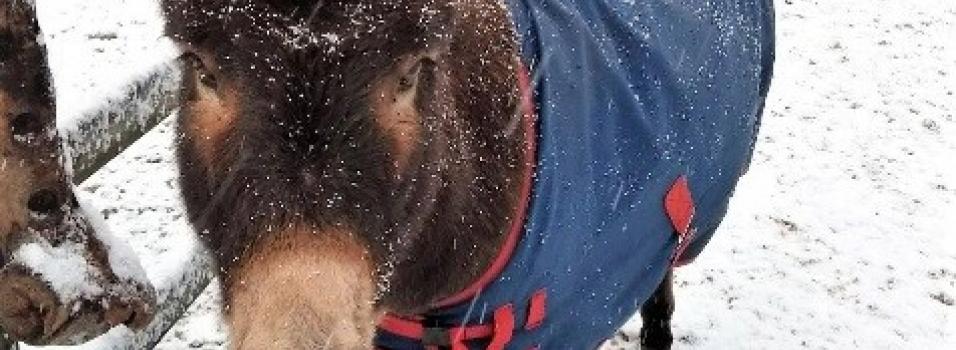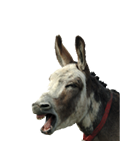Keep your donkey warm in winter!
It is scientifically proven: donkeys need more protection from the winter weather than horses. A new study from The Donkey Sanctuary shows that donkeys, and to a lesser extent mules, are less able than horses to adapt to colder, wetter climates and therefore require additional protection in the winter to meet their welfare needs. The findings are now published in the Equine Veterinary Journal. It reports how measurements of the insulation properties of the hair samples (weight, length and thickness) indicate that donkeys’ coats do not change significantly across the seasons and that their coats were significantly lighter, shorter and thinner than that of horses and mules in winter. In contrast the coats of horses and ponies changed significantly between seasons, growing much thicker in winter. Keeping donkeys comfortable throughout the winter months requires some special considerations. here we let you know what you have to look at.
SO BE PREPARED AND PLAN AHEAD FOR YOUR DONKEY’S WINTER
Order your winter forage & bedding in plenty of time, and always have a couple of weeks extra supply in hand just in case of heavy snowfall and roads being closed. Check that their vaccinations and parasite control are all up to date. Have your donkey’s farrier visit to make sure that his feet are neat and tidy, and make sure that your donkey’s dental checks are up to date. A donkey with poor dentition or whose teeth have gone unchecked, may well have kept condition whilst out at grass throughout the summer months but will start to find chewing more difficult with the lack of moisture in dryer forage such as hay and straw. A donkey who is experiencing difficulties with chewing will not only feel uncomfortable, but could quickly loose condition during the winter potentially causing further health problems. If you have any concerns regarding your donkey’s routine treatments or dental care always contact your vet for advice. Make sure that you have a couple of bags of road salt at hand for gritting yards, areas of hard standing and pathways, to ensure that both you and your donkey stay on your feet!
SHELTER
WINTER CARE IS MORE ABOUT HELPING YOUR DONKEYS TO WITHSTAND THE LOWER TEMPERATURES AND STAY HEALTHY IN THE COLD OR WET WEATHER, RATHER THAN SHUTTING THEM IN COMPLETELY. Providing that your donkeys have constant access to adequate shelter, most donkeys will prefer the freedom of being out even in the colder weather as opposed to being shut in a stable for days on end. From a donkeys point of view his worst possible scenario during the winter is not a cold and frosty day, but a day which is both wet and windy. Although your field may have some natural shelter such as trees and hedgerows, due to the donkeys lack of waterproof coat a proper shelter is really imperative for your once desert dwelling animal to enjoy a comfortable winter. A suitable donkey shelter should be a structure of least three sides and a sloping roof, sited in a sheltered area, and preferably with a concrete base. The shelter should have solid walls from the ground up, be free from draughts and be waterproof. It is important when choosing a location for your shelter that the opening side is out of prevailing winds. The floor of the shelter will need to be covered with fresh bedding. A fenced area of hard standing next to your shelter or stable is a necessary requirement for your donkey should he need to be shut off the wet, muddy, or frosty ground for a period of time. Grazing frosty grass has been implicated in increased occurrence of laminitis in donkeys so you should avoid turning them out from a stable onto grass during periods of frost particularly with late frosts followed by bright sunshine. At these times grass is particularly high in fructans (a type of soluble carbohydrate) which is thought to initiate the onset of laminitis.
FEEDING
MOST FIT, HEALTHY DONKEYS WON’T REQUIRE ANY ADDITIONAL FEEDING OTHER THAN AN INCREASE IN FORAGE OVER THE WINTER MONTHS. However, if you feel your donkey is struggling to maintain weight then there are several options available for increasing your donkeys’ energy intake in a safe manner which will not put them at risk of further health problems such as gastric ulceration and laminitis. Please read the Donkey Sanctuary Fact Sheets on feeding for further information or contact your vet for advice. You can also contact The Donkey Sanctuary as we are always happy to give feeding advice. It is important to monitor your donkey’s weight and condition score throughout the winter months and alter the amount of feed your donkey gets accordingly. Access to an equine mineral lick is important all year round for donkeys, but more so in the winter if access to grass is restricted.
WATER
ADEQUATE WATER INTAKE IS VITAL TO MAINTAIN YOUR DONKEYS' HEALTH AND WELLBEING DURING THE COLDER MONTHS. It is common for donkeys to drink less as the temperature starts to fall and during times of prolonged cold or frosty weather, which added to an increase in dry forage intake could increase the possibility of colic. Therefore it is as important to continue to monitor your donkey’s intake of water as much during the cooler weather as it is during warmer summer months. Keeping your donkeys’ fluid intake up can actually be one of the biggest challenges of winter, especially if you have older donkeys or donkeys with dental problems. You can encourage your donkey to drink by making sure that any ice is removed daily from water troughs. Given a choice they will prefer to drink tepid water during cold weather rather than cold so warming it up by adding hot water several times a day will not only help prevent it from freezing but will also delight your four-legged friend. To help prevent troughs from freezing a small floating football can be placed into the trough to keep the surface water moving, or a float heater can be purchased. Plywood can be used to cover and insulate part of the trough leaving a smaller space for the donkey to drink from, and the trough, if mobile, can be sited somewhere it will catch the winter sun during the day, therefore making it less likely to freeze. If you are not at home during the day consider placing a bucket of water in their stable where it is unlikely to freeze.
MENTAL STIMULATION
If your donkeys need to be kept off their pasture for any length of time during the winter it is likely that they will become bored and need extra mental stimulation. Therefore it is a good idea to provide your donkeys with something to chew and play with particularly if you do not want your post and rail fencing to fall victim to their idle minds. Logs from non-poisonous varieties of tree such as Hazel, Ash, Beech make ideal objects for donkeys to chew, but need to be replaced regularly as donkeys chew the bark off. Encouraging regular exercise by taking your donkeys out for a daily walk in-hand will also be of great benefit. Snack balls in which you can hide feed, inflatable rubber equine toys, and equine footballs are also things which can be considered to help keep your donkeys entertained. However, with any type of toy which involves feeding, a donkey’s intake should be carefully monitored. Finely chopped apples or carrots make a tasty natural and low calorie treat to either add to a snack ball or hide around your donkey’s environment for them to find. Giving them something succulent will also have the added benefit of replacing some of the moisture lost his diet due to the temporary lack of grazing imposed by bad weather.
RUGS
Young and healthy donkeys are extremely unlikely to need a rug, however if you have a donkey who is old or sick they may find it more difficult to maintain body heat and so may need some help to keep warm. Make sure you have a rug ready and clean for winter if your donkey is likely to need one. Elderly donkeys may also benefit from having a heat lamp put up in their stable for extra warmth during the coldest months of the winter. If your donkeys are wearing rugs then they should be removed daily and the donkey’s coats brushed before the rugs are replaced. On warm dry winter days it is nice to leave your donkey’s rug off for an hour or two, but ensure that they do not become cold or wet. It is also advisable to have a spare rug so that if one gets particularly wet is can be taken off and dried, replacing it with the spare rug so that your donkey always stays dry and warm. It is also useful to have a spare just in case one gets damaged and needs to be sent away for repair. During the winter months rain scald & mud fever are more likely to affect you donkey, particularly if they do not have access to shelter and hard standing. Both of these conditions can occur when the skin/hair is wet for a long period of time. Rainscald affects the shoulders, back and rump, whilst mud fever affects the lower limbs. The organism responsible is Dermatophilus and causes crusting of the skin and matting of the coat, if you suspect your donkey may have either of these conditions contact your vet for advice.
FEET
Keeping your donkeys’ feet healthy during the winter is important and picking feet out daily is essential if problems like thrush are to be avoided. Bedding in stables and shelters should be kept clean and dry, and donkeys should be kept off muddy fields. If your gateways become muddy during winter but the paddocks are still suitable for grazing then ordering some non-poisonous barkchip at the beginning of the winter months will ensure you have some to put in muddy gateways in order to keep the donkeys feet clean and dry. Finally, remember not to groom your donkeys if they are wet, as brushing will push water and dirt down on to the skin causing them to become cold and risking a chill. However, even if they are too wet to brush you should still clean their eyes, nose and pick out their feet as normal.




